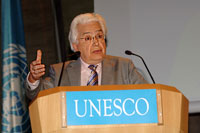| |
 |
 |
|
 |
 |
|
 |
 |
|
 |
| Interview with Mohammed Arkoun: "Human beings have always lived in situations of fragile peace" |
 |
| On 18 September 2008, the Director-General of UNESCO awarded the 2008 UNESCO Prize for Peace Education to the Institute for Justice and Reconciliation in South Africa, for its outstanding efforts towards a lasting reconciliation through education and against systemic injustice in Africa. Mohammed Arkoun, President of the International Jury for the 2008 Prize, explains the reasons for this choice. He asserts that human beings have always lived in situations of insecurity. Societies cannot build a culture of peace without a culture which is shared globally. The work, undertaken by this Institute, must persevere in this direction. |
 |
 Articles 3 of 3
Articles 3 of 3
 |
 You preside over the jury which selected the Institute for Justice and Reconciliation in South Africa, as the winner of the 2008 UNESCO Prize for Peace Education. How did you come to this decision? You preside over the jury which selected the Institute for Justice and Reconciliation in South Africa, as the winner of the 2008 UNESCO Prize for Peace Education. How did you come to this decision?
The Institute caught our attention among the fifty applications we received, because it corresponded to the selection criteria, both in terms of the quality of the project developed, as well as in terms of the institution responsible for its implementation.
The primary and decisive criteria is the project or activity’s conformity with what must be today, research and transmission of results, as well as a shared culture at the global level, because war is global.
There is no peace without intellectual consensus on the notion of a culture of peace, without communication and transmission channels to disseminate this culture in a society, through schooling, but also through other areas of speech that need to be established if they do not already exist. Today, these areas hardly exist, there are no spaces designed to disseminate the culture of peace which is in the process of being established.
How does this prize contribute to the establishment of a culture of peace?
The modest contribution comes from civil society initiatives. States often do not engage in this type of research. States glorify the nation and citizens’ sacrifices to defend the homeland. They exalt military victory. For example, the image of Napoleon in the eyes of the French is very different from an Italian and Russian perspective. However, the European Union has begun to build and develop a culture of peace since it became, in the 1950s, a legal, political and civic reality. It has become a reference that gives hope to the establishment of a culture of peace.
You present the European Union as a kind of reference, which brings hope to the establishment of a culture of peace. What is its specific contribution?
The specific contribution of the European Union is to build bridges between cultures, even if, for the moment, it is trying to consolidate its existing institutional, legal, cultural and educational assets, which are still weak. It cannot, therefore, in its present state, open bridges to North Africa, to Turkey and to the Southern Mediterranean states, i.e. Muslims.
In most people’s minds, we are not yet ready for a Mediterranean Union, but progress is being made, and there is also the possibility of enlarging the European area to include Southern countries where a culture of peace exists. It remains a project, although it is already under construction. Human beings have always lived in a situation of fragile peace, it remains unaccomplished. That is why we are here today with some hope and good will. There is work being done and it should be sustained.
Interview by Coraline Bardinat
Photo: © UNESCO/C. Bailleul |
| |
 |
| Author(s)
|
UNESCO |
|
|
|
|
|
|
| Publication date
|
18 September 2008
|
| Publisher
|
UNESCO |
| Publication Location
|
Paris, France
|
|
|
|
|
|
|
|
|
|
|
|
|
|
|
|
|
|
|
|
|
|
 |
 |
 Email this page Email this page  Printable version Printable version
|
 |
|
|


